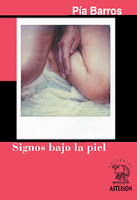 The White Islands= Las islas blancas by Marjorie Agosín; Jacqueline Nanfito (Translator); Michal Held (Introduction by)
The White Islands= Las islas blancas by Marjorie Agosín; Jacqueline Nanfito (Translator); Michal Held (Introduction by)Call Number: PQ8098.1.G6 A2 2016
ISBN: 9780983322092
Publication Date: 2016-08-15
“I only wanted to write about them, / Narrate their fierce audacity, / Their voyages through the channels of the Mediterranean.” So begins a poetic journey through the islands of the Mediterranean that served as homes and refuge for the Sephardic Jews after the Alhambra Decree, which ordered their expulsion from Spain. Inspired by her own journey to Salonika and the Greek Islands, Rhodes, Crete, as well as the Balkans, Marjorie Agosín searches for the remnants of the Sepharad. Presented in a beautiful bilingual Spanish-English edition, Agosín’s poems speak to a wandering life of exile on distant shores. We hear the rhythm of the waves and the Ladino-inflected voices of Sephardi women past and present: Paloma, Estrella, and Luna in the fullness of their lives, loves, dreams, and faith. An evocative and sensual voyage to communities mostly lost after the Holocaust, The White Islands offers a lighthouse of remembrance, a lyrical world recovered with language and song, lament and joy, longing and hope.
 Jacqueline Nanfito
Jacqueline Nanfito Mujer Pelo-Pez (Fish Hair Woman) by Merlinda Bobis (Author); Jacqueline Nanfito (Translator)
Mujer Pelo-Pez (Fish Hair Woman) by Merlinda Bobis (Author); Jacqueline Nanfito (Translator) Signos bajo la piel = Marks beneath the skin by Pia Barrios, Jacqueline Nanfito
Signos bajo la piel = Marks beneath the skin by Pia Barrios, Jacqueline Nanfito